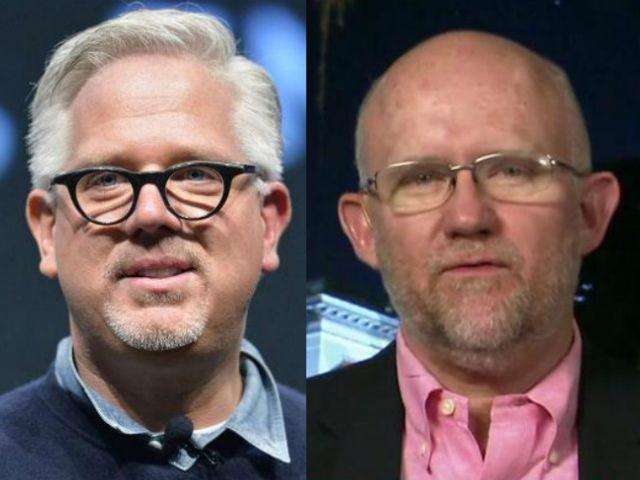Did the Trump Party Hijack the Tea Party?
Glenn Beck, Rand Paul, and others with TP cred sure seem to think so

On Tuesday, mercurial broadcast populist Glenn Beck, a frequent and welcome face at Tea Party events since the rise of that anti-government group in 2009, said this about Donald Trump's supporters:
The media's making this look like [they are] Tea Party people. I don't think these are Tea Party people who are following him. Some of them may be, but I think these — I mean, you can't — if you were a Tea Party person, then you were lying. You were lying. It was about Barack Obama being black. It was about him being a Democrat, because this guy is offering you many of the same things, as shallow as the same way. If you said to me that it bothered you about his past, you said to me, 'Hey, what about his relationship with Jeremiah Wright? What about what he's done here, here, and here?' You're not bothered by this guy, and it's exactly the same thing.
Bolding mine, to emphasize the oh-no-he-di-unt! (Over at Hot Air, Allahpundit points out that Beck said very similar things in December 2011 about Tea Party support for Newt Gingrich.) The Blaze auteur also said Tuesday that Trump "scares the hell out of me," reminds him of "what a dictator says," and basically is a harbinger of an awful American future "if we don't stop this right now." So he's just not that into him, it seems.
Beck is not the only one with TP cred making similar laments. Outspoken (read: very funny) GOP strategist Rick Wilson has a piece in today's Daily Beast titled "How the Tea Party Got Hijacked by Trump's Troll Party." Excerpt:
So who comprises the Troll Party? Some of them are a distaff faction of the Tea Party, angry that the leadership in Washington doesn't pursue their agenda with the bloody-mindedness and tempo they demand. Many are angry that the GOP lost to Barack Obama twice and, in their minds, allowed through action or inaction a set of economic, social, and cultural changes that make them feel powerless. For them, supporting Trump feels like rebellion. They crave a sense of agency in the face of a political culture in D.C. that they believe loathes and disregards them. […]
For all their professed adoration of the Constitution, the mutant Tea Party element now supporting Trump seems entirely willing to toss it aside. When Trump jokes about "having immediate elections… let's just vote today like they do in other countries," the same people cheering themselves hoarse would be in a rabid frenzy if Obama or Hillary Clinton said it, joking or not. Troll Partiers love all the parts of the Constitution, except the ones noted legal scholar Donald Trump decides can be cast aside. […]
Nothing is more important to them than Trump as an avatar for their rage. They've become a fun house mirror version of everything we once mocked Obama supporters for being: cultish, immune to facts, swift to attack apostates, glassy-eyed and swaying as if the Great Man was going to lead them to the Kool-Aid troughs in the hot Guyana sun. They've become like Scientologists, only more fanatical, more vengeful, more sealed in a hermetic political domain where nothing matters but fury, acting out, and punishing the unbelievers.
It goes on like that.
And unsurprisingly, distant GOP contender Sen. Rand Paul (R-Ky.) has been singing a similar tune, here to Glenn Beck last week:
Paul said Wednesday that "nothing" that rival Donald Trump is for "is what the Tea Party was about." […]
"I think to me the most offensive of the positions that he's taken isn't that he was for Obamacare before he was against it, or that he's for higher taxes or the government stimulus," Paul said. "It probably is this notion of private property. Most of his business deals have been predicated upon asking government to take land from other people."
It's kind of amazing to remember that, as the Wall Street Journal's Daniel Henninger pointed out yesterday on a Fox Business Network panel I was on, the disruptive Tea Party already produced three candidates in this race: Paul, Sen. Marco Rubio (R-Fla.), and Sen. Ted Cruz (R-Texas). Each ran an insurgent campaign against the GOP's preferred candidate, each stressed cutting government in the face of Republican fecklessness in D.C., each brought an injection of youthful vigor and impatience into the hoary House of McConnell.
But their flavors of anti-establishmentarianism–with Cruz chasing the Trump insurgency, Rubio veering toward the Establishment, and Paul making the lonely case for libertarianism–have so far failed to catch fire in 2015. One big subtheme of tonight's debate will be whether the original stalwarts of the Tea Party can wrestle back that label and some of its associated support from the man who has gobbled up the grassroots oxygen so far in this campaign.


Show Comments (134)